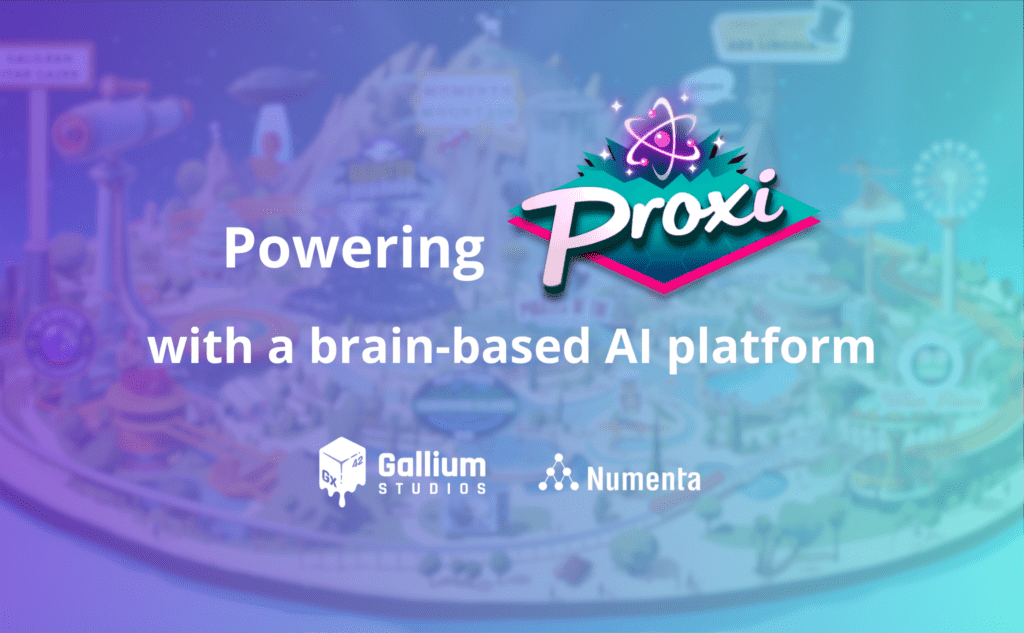This is a joint blog post co-authored by Numenta and Gallium Studios.
Numenta’s story begins with the core belief that to build efficient and intelligent AI systems, you first need to understand how humans think and learn. Gallium Studios, on the other hand, is leveraging insights from neuroscience and using AI to create deeply personal and immersive game experiences.
When our paths crossed, it felt like a natural fit. Numenta and Gallium Studios both share a vision that leverages neuroscience in unique and powerful ways, driving new and exciting possibilities in gaming and AI.
A neuroscience-based approach to AI
At Numenta, we’ve always been driven by the mission to understand the human brain and use this knowledge to advance the field of AI.
If you look at the human brain, it runs on around 20 watts of power, the same energy needed to power a dim light bulb, yet it’s highly efficient. In stark contrast, training and running large language models (LLMs) to power applications such as ChatGPT consumes vast amounts of energy, and this consumption is growing exponentially. Deep learning also relies on a brute force approach, needing to be trained with trillions of texts and tokens, unlike humans who can learn new concepts from just a few examples and by interacting with the world. By incorporating ideas from the brain, we are able to dramatically improve the speed, energy efficiency and learning ability of today’s AI systems.
Proxi: a game of self-discovery
Inspired by how memories are stored in our brains and how they affect our thoughts and feelings, Gallium Studios’ new simulation game, Proxi, is a game of self-discovery.
Imagine a game where you can input your most significant memories—not just everyday events, but the moments that define your life. You enter these memories as keywords and the game will visualize them using 3D objects, photos, and audio in “memory bubbles” or “snow globes,” which then contribute to building and interacting in a virtual world with Proxi avatars.
Proxi leverages AI to analyze your memories and build maps of how you view the world. It can uncover subconscious associations and patterns you might not have been aware of. For instance, while most people might find spiders frightening, you might find them fascinating. Proxi highlights these unique perspectives.
These perspectives are represented by dynamic avatars called Proxies, allowing players to create and interact with a world built from their memories. Proxies can adapt, gain new traits and evolve based on ongoing inputs from the player’s memory and game interactions, allowing for a constantly changing and evolving gameplay experience that is intimately tied to the player’s own life and memories. Players can also choose to build shared worlds where their avatars can interact, learn and evolve with each other. With Proxi, players explore their identity and past, using the game as a tool for self-discovery and reflection.

Under the hood: the Numenta Platform for Intelligent Computing
The technology behind Proxi is as fascinating as the concept itself. Proxi is powered by Numenta’s brain-based AI software platform, the Numenta Platform for Intelligent Computing (NuPIC).
NuPIC includes a suite of highly optimized LLMs that Gallium Studios uses to analyze how players create and arrange their memories, identifying patterns and relationships between them. This helps in constructing a conceptual map of the player’s mind, where similar memories are clustered together, providing insights into a player’s thought processes and view of the world.
Based on the player’s conceptual map, NuPIC LLMs are then used to generate personalized in-game content and bring the player’s memories to life. They also inform the behavior and personality of the Proxies by synthesizing new interactions and responses based on the player’s memory data in real time.

A scalable, secure and cost-effective platform for AI-simulated games
Built on some of the same principles that make the brain run efficiently, NuPIC is designed to help manage the heavy AI workloads that come with extensive gameplay by running LLMs extremely efficiently on CPUs. And Gallium Studios exemplifies the cutting-edge integration of AI in video games. By leveraging NuPIC, Gallium Studios can integrate powerful AI capabilities into Proxi and effortlessly scale to increased demand without creating cost and performance bottlenecks.
NuPIC enables Gallium Studios to run dozens to hundreds of LLMs on a single CPU server, significantly reducing overhead costs. Gallium Studios can use NuPIC to rapidly iterate and test AI-driven game features without breaking the bank. Additionally, running all large-scale AI tasks on existing CPUs frees up GPU resources, allowing the studio to effectively allocate these processors and their budget to other critical aspects of the game.
NuPIC can also be deployed on-premise, which means Gallium Studios has 100% control over their data and models. No user data and memories ever get sent to Numenta servers; and Gallium Studios can update, fine-tune and deploy the models in NuPIC whenever and wherever, giving them full control over how they’re building Proxi. Moreover, deploying on-premise ensures smoother gameplay (i.e. minimizes latency between networks) and reduces the reliance on costly and sometimes unpredictable cloud-based services. It safeguards player privacy and proprietary game mechanisms as the player base grows. NuPIC not only keeps costs predictable and manageable, it simplifies deploying LLMs and allows the studio to scale without any technical challenges.

Conclusion
What truly sets Proxi apart is its ability to offer a deeply personal experience for each player. By weaving their own past into the gameplay, players can explore their memories in a whole new way. NuPIC provides the robust foundation needed for the game’s complex memory analysis and world creation process. Together, we are pushing the boundaries of innovation and creating the next generation of groundbreaking games.
We can’t wait for you to try Proxi. Join our community for more updates: https://discord.gg/proxi
If you want to learn more about how NuPIC can help power your games, you can request a free use case consultation here.
About Numenta & Gallium Studios
Though they specialize in different fields, Gallium Studios and Numenta have a lot in common. Gallium Studios’ founders, Will Wright and Lauren Elliott, are renowned video game designers, with titles to their credit that include The Sims, Spore, and Where in the World is Carmen Sandiego. At Numenta’s helm is co-founder Jeff Hawkins, a renowned neuroscientist and entrepreneur who also co-founded Palm Computing and wrote the groundbreaking book, A Thousand Brains, and CEO Subutai Ahmad, an accomplished technologist and deep learning expert. Both companies boast legends in their respective fields, who have been following their passions for more than 40 years. They also share a common interest in the intersection of neuroscience and AI, and their partnership brings together the best of gaming with cutting-edge AI.
Learn more about Gallium Studios here: www.galliumstudios.com
Learn more about Numenta here: www.numenta.com

